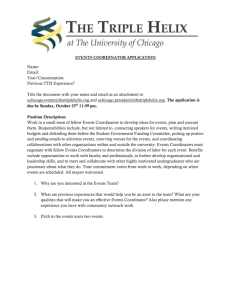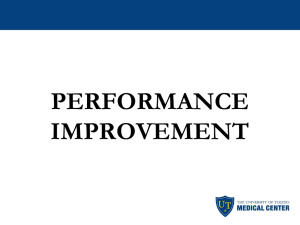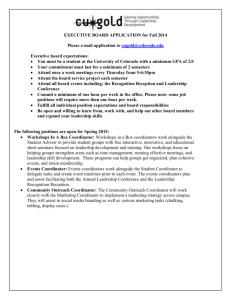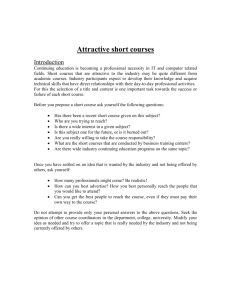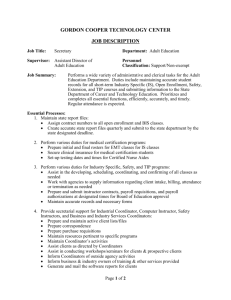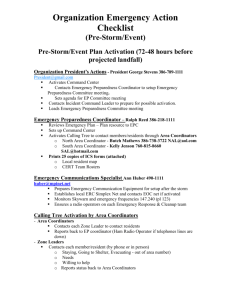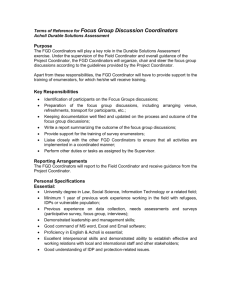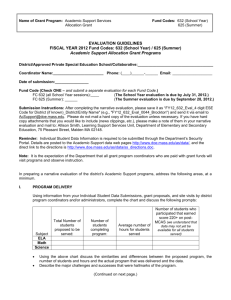The Contribution of a Coordinator's Role to the Anti
advertisement
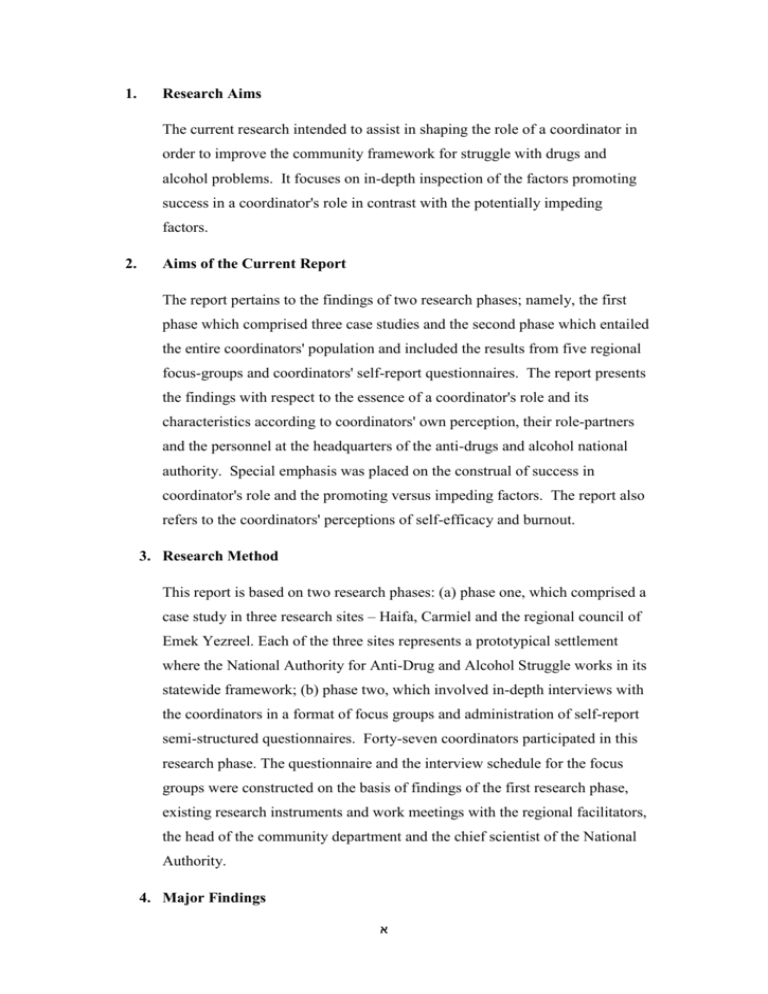
1. Research Aims The current research intended to assist in shaping the role of a coordinator in order to improve the community framework for struggle with drugs and alcohol problems. It focuses on in-depth inspection of the factors promoting success in a coordinator's role in contrast with the potentially impeding factors. 2. Aims of the Current Report The report pertains to the findings of two research phases; namely, the first phase which comprised three case studies and the second phase which entailed the entire coordinators' population and included the results from five regional focus-groups and coordinators' self-report questionnaires. The report presents the findings with respect to the essence of a coordinator's role and its characteristics according to coordinators' own perception, their role-partners and the personnel at the headquarters of the anti-drugs and alcohol national authority. Special emphasis was placed on the construal of success in coordinator's role and the promoting versus impeding factors. The report also refers to the coordinators' perceptions of self-efficacy and burnout. 3. Research Method This report is based on two research phases: (a) phase one, which comprised a case study in three research sites – Haifa, Carmiel and the regional council of Emek Yezreel. Each of the three sites represents a prototypical settlement where the National Authority for Anti-Drug and Alcohol Struggle works in its statewide framework; (b) phase two, which involved in-depth interviews with the coordinators in a format of focus groups and administration of self-report semi-structured questionnaires. Forty-seven coordinators participated in this research phase. The questionnaire and the interview schedule for the focus groups were constructed on the basis of findings of the first research phase, existing research instruments and work meetings with the regional facilitators, the head of the community department and the chief scientist of the National Authority. 4. Major Findings א a. The official documents clearly define the activities in which a coordinator is expected to engage and the persons with whom he or she is to maintain contacts. However, these documents lack clear reference to the priorities with regard to the various tasks, most desirable target populations, the responsibility and authority of the local governments versus the National Authority. In addition, the documents hardly specify a coordinator's role with respect to the use of alcohol and concerning various committees. b. Analysis of the documents, interviews with the staff at the headquarters and with the coordinators points at lack of clarity concerning expected and measurable outcomes in terms of a coordinator's work with regard to drug and alcohol use. c. The documents do not specify the relationships between a coordinator's activities and the actual outcomes. d. The characteristics of a coordinator's role A coordinator's role is perceived as important, unique, professional and irreplaceable. Albeit, the uniqueness of this role is not altogether clear to the community residents and the professionals operating there. The main thrust of a coordinator's activities concentrates on integration and building partnerships (cooperation). Coordinators invest considerable efforts in these domains, thus are in need of support system, including training. Actual and desirable profile. The characteristics which describe the actual and desirable profile of a coordinator include: dispositions, such as self-efficacy, dynamism, multi-tasking capability, creativity, personal initiative, capacity of building and maintaining interpersonal relationships and networking, self-learning and learning from experience, mapping capability at the organizational, community, political and personal level. It is worth noting, that these features were derived by means of the coordinators' intuitions rather than systematic analysis. Coordinators are located at a central position in the community organizational structure, allowing them familiarity with the organizational map, initiation and actual building of various partnerships. ב A coordinator's activities include representation, marketing, development and maintenance of partnerships, project development and maintenance in order to demonstrate visibility, mobilize, integrate and leverage resources. Coordinators work with various populations in the community. The emphases in coordinators' activities change over time: initially they engage in community mapping and later they concentrate on projects and partnerships building and maintenance. Dilemmas in a coordinator's role. o Double accountability – coordinators maneuver between the local government and the National Authority for Anti-Drug and Alcohol Struggle. o Position and Centrality of the National Authority as an organization granting a sense of belonging to coordinators in their daily activities. o A coordinator's authority – coordinators ponder about the very existence of their authority and sources of its legitimacy. Nevertheless, they stress the importance of professional knowledge, the position at the organizational hierarchy and their available resources as a partial source of their legitimacy. o Management ingredients in a coordinator's role. The coordinators barely see management aspects in their role since they usually do not supervise subordinates. The role is mainly viewed as executive in nature. Such executive focus seems to interfere with strategic thinking. o Decisiveness dilemma. The coordinates contemplate over the limits of decisiveness in efforts of building partnerships or initiating activities, and how, if at all, specify this limit. e. Success in a coordinator's role. Most of the success stories describe activities with parents. Generally, the coordinators experience difficulty in relaying success stories. Success in their eyes appears elusive, easily transferable into lack of success. ג Definition of success changes as a function of a location and phase in coordinators' seniority on the job. Outcomes of activities usually are not perceived as measures of success (including decrease in use of drugs or alcohol). Success is defined as quantitative or essential change, as a coordinator becoming a "brand address", institutionalization of activities, building partnerships and cooperating with other professionals in the community, attaining goals and making the issues of drugs and alcohol visible at the community level. Some coordinators view matching the activities to the community needs as a success. No minimal performance or outcomes are specified, allowing evaluation of a coordinator's success. Such paucity on the one hand fosters flexibility and greater fit with the specific community, but on the other hand impedes coordinators' sense of success due to difficulty in measuring it. The findings point at three criteria for evaluating success of partnerships: success of the idea, the very establishment of partnership and taking place of an activity. Measures of success. The coordinators propose a variety of measures, which change as a function of a coordinator's seniority, community characteristics and organizational structure. Among the suggested measures were: the mere existence of an activity, ascribing credit to the National Authority, the number of participants, continuance of an activity and its extension. There was no reference to outcomes in terms of knowledge, skills and attitudes. f. Factors affecting a coordinator's success. (1) The National Authority – its policy, messages, support and guidance provided to coordinators; (2) personal factors, such as mapping capability on the community, organizational, political and personal level, the capacity to develop and sustain relationships with other professionals and officials, the capability to develop projects, marketing and PR capability. Prior knowledge in the ד domain of drugs and alcohol has no significant impact on success. However, prior experience and educational background allows creating a unique niche; (3) support of the local government. g. Factors impeding a coordinator's success: organizational aspects such as dependence on others, position at the organizational structure, gap between perceptions at the headquarters and the line, double accountability – The National Authority and the local government and competition or rivalry with other professionals in the area. h. Self-efficacy. The coordinators exhibit high levels of self-efficacy. i. Burnout. The findings show low levels of the coordinators' burnout. Presumably, group meetings and meetings with the facilitator mitigate their burnout. Recommendations 1. Definition of "core job functions and activities" of a coordinator at the national and community level, with some of these being universal while some matching the community, culture and sector characteristics. 2. Discussion with regard to the need to match coordinators' education and training with the phase in their job seniority. Potential training areas constitute: management of partnership, project management, marketing and PR. 3. Development of tools allowing systematic and in-depth mapping of the community. 4. Providing responses at the headquarters level to the following issues: Clear and applicable definition of the National authority policy with respect to alcohol, including coordinators' role in this area in all sectors, particularly in the Arab sector. Clear definition of areas of responsibility of the National Authority versus the local government. Clarification with regard to priorities of coordinators' tasks and target populations. Clarification with regard to the committees to be established, their missions and authority. ה Clear definition concerning expected outcomes of a coordinator's activities, in measurable terms and specification of ways to follow-up of these outcomes. Periodical process of systematic reflection amongst the coordinators and learning from success, including documentation of the process and dissemination of the protocols. Sharpening the National authority messages, notably definition in operational terms of goals, objectives and modes of operation expected from the coordinators. 5. To convene focus groups of coordinators and facilitators, designed to develop "core measures" of the universal criteria on the basis of those presented in the current report. 6. Discussion concerning the authority and managerial aspects in a coordinator's role at the regional and national (headquarters level). 7. Sharpen and clarify the relationship between the National Authority and the local governments. 8. Development tools for community mapping. 9. Definition of "minimum performance level" concerning outcomes, activities, projects and partnerships expected from coordinators. Issues for Discussion Whether and to what extent the National Authority is willing to engage with drugs and alcohol problems at the overall societal level? Who constitutes the supporting community, professional "home" and security network for the coordinators – the National Authority, the facilitators or both? ו ז
